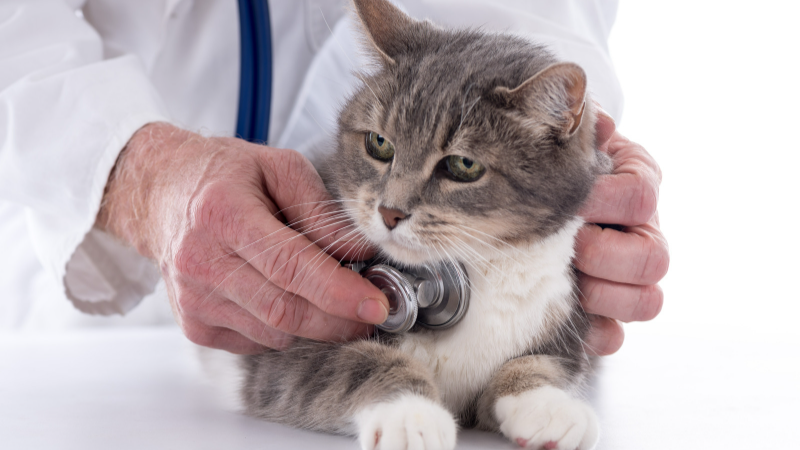
A lot of people view old age in pets as an unavoidable disease. In reality, our cats and dogs could just be slowing down as they get older. Old age isn’t always the reason why your pet is acting differently, especially if their behaviours have changed rapidly.
Other medical reasons could cause your pet to act ‘old,’ which is why veterinarians will often recommend a senior wellness test.
What is Senior Wellness Testing?
Senior wellness testing will give you a snapshot of your pet’s health. There are four categories in a senior wellness test: blood counts, blood chemistry, baseline thyroid levels, and urine testing.
Your veterinarian may also recommend blood pressure monitoring and chest x-rays. Further diagnostic testing will be recommended if these tests reveal abnormalities.
The 4 Categories of a Senior Wellness Test
Complete blood counts
Looking at complete blood counts (CBC) will find if there are any underlying health conditions. Changes in red or white blood cells are indicators of several conditions or chronic diseases.
Red blood cells are responsible for carrying oxygen to the tissues, while white blood cells help fight infections and diseases. A low red blood cell count – also called anemia, can indicate immune-mediated conditions. These include cancer, parasites, and other chronic diseases.
Changes in white blood cells are associated with inflammation, infections, immune-mediated conditions, and cancer.
Blood chemistry
Blood chemistry tests measure blood sugar (glucose), proteins, as well as liver and kidney levels. Sodium, potassium, and chloride (electrolytes) are also measured to check for abnormalities in the pancreas.
Older, female, and overweight dogs are more likely to develop pancreatitis. Although it can happen at any age, pancreatitis is something your vet will look out for when performing a senior wellness test.
The pancreas helps with digestion and insulin, and when it becomes inflamed, can cause damage to the small intestine. Symptoms include:
-
Lethargy
-
Nausea
-
Vomiting
-
Diarrhea
Most cases of pancreatitis can be treated without any long-term consequences, although it’ possible dogs can get it more than once in their lifetime. It isn’t common in cats; however, your vet will still test for it in a feline senior wellness test.
Baseline thyroid levels
The thyroid gland sets the body’s metabolic rate to keep optimal levels of body processes. High thyroid levels are common in a feline condition known as hyperthyroidism, while low thyroid levels - hypothyroidism are more common in dogs.
Cats have two thyroid glands, and hyperthyroidism occurs when the thyroid hormone is overproduced. Hyperthyroidism is seen mostly in cats over the age of 12 but is easily treatable.
Hypothyroidism occurs when the thyroid is underactive, causing a pet’s metabolism to drop. In dogs, hypothyroidism is usually caused by immune-mediated diseases. While it's treatable, it isn’t curable. A dog with hypothyroidism will need to take an oral thyroid replacement hormone for the rest of its life.
Urine testing
There are three methods used to collect a urine sample in cats and dogs:
- A sterile needle is used to collect urine from the bladder.
- A catheter is passed up through the urethra into the bladder,
- The pet voluntarily urinates into a sterile container.
Urine samples are analyzed to measure the colour, concentration (density), acidity (pH) and cells (crystals). Glucose, proteins, and other metabolites are also measured.
When should I consider taking my pet to the vet for a senior wellness test?
You are likely familiar with your dog or cat’s day-to-day sleep patterns. But as they get older, it’s important to watch for changes in rest time to figure out whether sleep is a symptom of normal ageing.
If your senior pet’s sleep patterns have changed, consider watching for the following changes in behaviour:
Sounds aren’t disturbing sleep
Cats and dogs can lose their hearing as they get older. It’s a gradual change, and you may notice it when your pet appears to sleep more deeply. Hearing loss will decrease your pet’s ability to hear alarm clocks, cars driving into the garage, or other loud noises that used to disturb them.
Pets start to lose their hearing when the little bones inside their ear harden, which could also result in chronic ear infections or ear canal polyps.
Staying in one sleeping position - for a long time
Bone and joint problems like arthritis, chronic cruciate injuries, and back problems can cause stiffness and pain. Pets are less likely to move from a sleeping position when it hurts to get up.
If your pet does suffer from arthritis, try to give them a comfy place to sleep! Extra soft bedding in a non-drafty area of your home. If your dog sleeps on a couch or bed, getting steps to take away the need to jump is very helpful to reduce pain.
Something is causing them to stay awake
Pets with diabetes or other hormonal problems may be hungry all the time and spend their nights knocking around bowls and scratching at cupboard doors. Diabetes mellitus, adrenal gland disease, kidney problems, and bladder infections can increase the frequency of urination which could keep them up at night.
Anxiety is another cause for sleeping less. Senior cognitive dysfunction (like human dementia), decreased vision, hyperthyroidism, blood pressure changes, and heart disease can all increase a pet’s anxiety at night. If your pet is suffering from anxiety, they may pace around or cry if they can’t settle down to rest
In Summary
There can be medical explanations for many things we take for granted as “old age changes”. If you find yourself thinking, “hmmm…that’s not normal for Fluffy,” schedule an appointment with your veterinarian. They will perform a senior wellness test and discuss a plan that best meets your pet’s healthcare needs.All Petsecure plans cover the cost of examinations, taxes, and diagnostic testing for eligible senior illness conditions. Annual wellness testing coverage for healthy pets is available under the Secure 4 plan. Learn what’s covered by Petsecure and choose your plan
